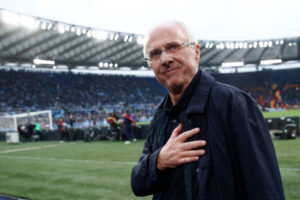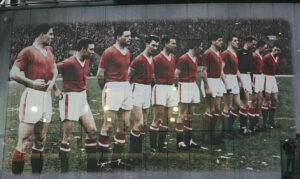The winter of 1962-63 was bitter. So many football matches were postponed that the FA Cup final had to be put back three weeks. In Sunderland, Boxing Day was raw and cold, “the kind of day when seagulls flew backwards to stop their eyes watering”, as Brian Clough put it. Middlesbrough’s game, 32 miles to the south, was called off, but 90 minutes before kick-off at Roker Park, the referee Kevin Howley declared conditions playable: Sunderland’s game against Bury could go ahead. Clough congratulated the official on the decision.
Half an hour before kick-off, an ugly grey-yellow cloud drifted over the ground and unleashed a ferocious hailstorm, worsening conditions significantly. But the decision had been made. A large crowd was already inside. The game was going ahead. Charlie Hurley, Sunderland’s revered captain, missed an early penalty. Even 50 years later, he was asking himself whether things might have been different had he converted it. Then, with 27 minutes played, Clough chased a slightly overhit through-ball. Had Sunderland been 1-0 up, might he have been slightly less aggressive?
Clough stretched for the ball and collided with the Bury goalkeeper Chris Harker. As Harker’s shoulder crunched into high right knee, Clough flipped over the top of him and hit his head on the icy ground. For a couple of seconds, there was darkness. Then he tried to get up but his leg would not respond. He crawled hopelessly and then collapsed; both medial and cruciate ligaments were torn. Clough’s career as a centre-forward was over.
This week marks the 20th anniversary of the death of Clough from stomach cancer at the age of 69. Yet he remains a surprisingly constant presence in the mind of English football, the ideal of a particular type of manager, irascible, unpredictable and charismatic, a leader who inspired his teams largely by force of personality. He lives on in countless clips in which he is outrageous, charming and funny, most notably the episode of Calendar on the day he had been sacked by Leeds in which he and his predecessor Don Revie go toe-to-toe.
It’s extraordinary television and has drawn comparison with the debate between John Kennedy and Richard Nixon in 1960 when those who listened on the radio thought Nixon had come out on top, while those who watched on television believed the handsome Kennedy had run rings around his sweating opponent. Here too, if you actually listen to the words, Revie makes some good points, but it doesn’t matter, because he is ponderous and thickset, while Clough is nimble, sharp and amusingly provocative. He is also, fairly obviously, pissed.
It wasn’t until the late Nineties when the Arsenal captain Tony Adams spoke publicly about his struggles with addiction that football began to take its relationship with booze seriously. That Clough descended into alcoholism is well known but it tends to be an addendum to his story. His appearance in his final season at Nottingham Forest, when he oversaw their relegation 16 years after he’d led them to promotion, couldn’t be ignored, his skin turned now red and blotchy. It happened to be the season of great change in English football when the First Division switched to the Premiership and the sense was that the new football had no place for mavericks like Clough.
It was a convenient framing. The iconoclast who, armed with little more than a sharp wit, dragged himself up from Hartlepools, got Derby promoted and won the league with them, blew up at Leeds, served his time in the wilderness at Brighton and then returned to lead Forest in the space of four seasons to promotion, a league title and two European Cups, before finding the economics of football had rendered obsolete his brand of messianic unorthodoxy.
And it wasn’t untrue. But there is another way of looking at Clough’s story. He was a prolific and brilliant goalscorer for Middlesbrough then Sunderland, scoring 250 goals in 271 league games before the injury, all in the Second Division. His only top-flight goal came in one of the three matches he played as he attempted a comeback in 1964-65 before accepting, aged 29, that his career was over. Even in the second flight, though, he’d forced his way into the England reckoning; there’s a not especially fanciful alternate reality in which he didn’t get injured, Sunderland were promoted in 1962-63 (rather than missing out by a single point having played half a season without his goals) and he was in the England squad when they won the World Cup in 1966.
Before the injury, Clough was almost teetotal. “He never had a smoke or a drink — well, maybe a half, you know, when he went out,” said his Middlesbrough team-mate Derek McLean. Clough and other Boro players used to go to a café owned by popstar Chris Rea’s father, Camillo, who persuaded him to replace his regular milkshakes with Oxo as a healthier option.
But the injury changed him. After an operation, Clough was in plaster for three months and admitted he would lie on his bed, staring at the ceiling, thinking of how little he had to offer. Brian alone among the eight Clough children who survived to adolescence had failed his 11-plus. He then failed an apprenticeship at ICI. Without his goals, he was just somebody who hadn’t been able to cut it as a turner-and-fitter. He went through arduous rehab, running up the steps in the stadium and along the beach at Roker, but it wasn’t enough. He showed some promise coaching the youth team but Sunderland, desperate for the insurance money that would come when it was confirmed his injury was career-ending, were callous in letting him go. He became embittered and began to drink.
Clough clearly idolised his mother who, at least in his telling of the story, prioritised academic achievement over anything else. Failing his 11-plus clearly hurt, and he seemed never quite to forgive his brother Bill for mocking him over it on the day he got his results. The “immaculate” Bill, he said, “was Mam’s favourite son. I never was. Perhaps it was because he won the teapot in a ‘lovely baby’ competition and I didn’t. Still… I had a reasonable consolation prize by winning the European Cup — twice.”
It’s a strikingly odd comparison, but it’s one that recurs. “I don’t have any O-levels, I don’t have any A-levels,” he said in a TV interview after his retirement, “and when my children chastise me and give me stick… I put my European Cup medals on the table, my Championship medals. I’ve got a tableful — they’re my O-levels and A-levels.” Throughout his career, Clough was reliably anti-intellectual, and yet his 11-plus clearly haunted him. There’s a sense even that his entire managerial career was an attempt to make up for that failure with his mother.
Clough’s Derby County were controversially beaten by Juventus in the semi-final of the 1973 European Cup. In both his autobiographies and countless interviews, he spoke of his distress that night, coming home and receiving the phone call that his mother had died. But it wasn’t true. She had actually died a month earlier, on the night that Derby had beaten Spartak Trnava in the quarter-final. Is it too much of a stretch to wonder if he conflated the events because he had vowed in his own mind that winning the European Cup would earn his mother’s approbation, and that, as he saw it, cheating Italians had stolen that from him?
If that is the case, if winning the European Cup to honour his mother’s memory became a grail, then suddenly his otherwise incomprehensible decision a year later to take over at Leeds United, a club he had repeatedly attacked, becomes explicable: as league champions, they were in the European Cup and so offered an immediate pathway to his ultimate goal. As it turned out, he lasted just 44 tempestuous days at Leeds and the European Cup wins came in 1979 and 1980, with Nottingham Forest.
The achievement was remarkable, but behind it all lay booze. When a friend visited him in his hotel in Leeds to help look for a house, Clough preferred to lie on the bed, drinking cans of beer, watching the cricket on television — as though perhaps he knew even then that there was no point buying property there. There was booze to calm everybody’s nerves on the night before major finals, booze to celebrate wins, booze to deal with the eternal grind of one game after another, booze to deal with the pain of his break-up with his old friend and assistant Peter Taylor and, in the end, booze just to get by.
The European Cup in 1980 was Clough’s last great success. There were League Cups after that but by the early Nineties, idiosyncrasy and eccentricity had become unreliability and rudeness, his genius had curdled into cantankerousness. After relegation came treatment, excruciating television appearances, illness and death.
Clough’s brilliance is undeniable. Only three other managers have ever won the league with more than one club, and nobody has done it with two medium-sized provincial sides; he had an extraordinary gift. But he never escaped the shame of his 11-plus, never got over the knee injury that denied him playing glory, never perhaps felt he had earned the love of his mother. And his response was to drown himself in alcohol.
His story was one of greatness, but behind the charisma and the outrageousness, it is also one of tragedy.
Disclaimer
Some of the posts we share are controversial and we do not necessarily agree with them in the whole extend. Sometimes we agree with the content or part of it but we do not agree with the narration or language. Nevertheless we find them somehow interesting, valuable and/or informative or we share them, because we strongly believe in freedom of speech, free press and journalism. We strongly encourage you to have a critical approach to all the content, do your own research and analysis to build your own opinion.
We would be glad to have your feedback.
Source: UnHerd Read the original article here: https://unherd.com/



